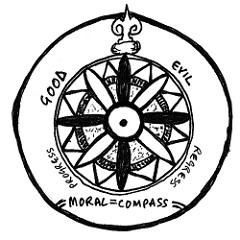Creation Corner
Moral authority and God

Evolutionists attack Christians all the time. Why? Because they have a problem with moral authority they cannot solve.
Trolling: stimulus and response
An anonymous Internet troll who identifies himself only as “Professor-Tertius” recently left this gem:
A hundred years from now, Evangelical leaders will be saying that the Bible itself never actually denied The Theory of Evolution and that it was only “some Christians, speaking only for themselves” who were saying poorly worded things against evolutionary biology and calling the science “a god-hating conspiracy” because some scientists were using science to attack Christians. Those Christian apologists of the future will make excuses and claim that it was simply over-reactions directed at controversial individuals who were using the complexities of science to attack virtuous Christians who simply happened to be insufficiently educated on scientific topics. “We all say stupid things at times when we are defending ourselves against unwarranted attacks!” Yes, I fully expect a re-writing of history. They will be correct in saying that the denial of The Theory of Evolution among many evangelicals of “those days of long ago when the science of evolution was so poorly taught in most schools” can be blamed in part for failures in public education but I expect far too many of my evangelical brethren’s great-great grandchildren will have moved on to deny some other area of science that they will not understand. We Christians have a poor track record in terms of learning from our past.
First, I challenge both the academic and the religious profession of “Professor Tertius.” He offers no proof of his identity, as either an academic or as a Christian.
Second, I don’t believe this earth even has a hundred years of history left to it. Yet I must regard that as off-topic. This is, after all, “Creation Corner,” not “Eschatology Corner.”
Third: he has it half right. Evolutionists do attack Christians, as I said above. They attack Christians on moral grounds.
The late Henry M. Morris, in Evolution’s Troubled Waters, quoted Sir Julian Huxley (Fellow of the Royal Society) as saying:
I suppose the reason we leaped at The Origin of Species was because the idea of God interfered with our…
Sir Julian then, by this account, named that which usually stays private.
That struck a nerve. Modern atheists know how ugly a thing that was to say. In their efforts to deny his having said that, they end up admitting that perhaps another Huxley, say Aldous (of Brave New World fame) or Julian’s grandfather Thomas, said that. Whether any of the Huxleys said that or not, atheists do say monogamy – having only one mate, or at least one at a time – does not lead to happiness or contentment. They further deny that lower animals keep only one mate. More broadly, they think they can dispute the idea that moral authority requires God.
Moral authority v. legal authority

A crude picture of the concept “moral compass.” Graphic credit: Paul Downey on Flickr.com, CC BY 2.0 Generic License
Let us recognize two sources of authority over human conduct: the moral and the legal. “Legal” here refuse to human law and government. To be more specific, it refers to the body of human contract, criminal, and “international” law (i.e., treaties). All these laws qualify as mutual agreements among human beings. When human beings make law, they agree among themselves: human does not kill human, nor defraud human, nor steal from human, nor lie to human authority trying to deal justice. Moral authority comes from command. And that axiom implies two corollary axioms: that some-One exists who commands, and a body of people exist subject to Him who commands.
Without God, we have none to command us. All we have, are mutual agreements. In other words, human law.
One can readily understand why human governments might make laws against murder, fraud, theft, and perjury. Such things damage the State as it tries to mediate among its citizens or subjects, or otherwise cause friction the State wishes to avoid. (Normally the State wants its citizens or subjects to work in nice, taxable harmony. The dead pay no taxes. The cheated pay a lower tax than they otherwise would pay. And so forth and so on.)
Where human and moral law differ
But can an atheist even recognize a moral breach involving the most exquisitely private contact between human beings, or anatomy as entertainment?
Without question many secular humanists assert–even scream–that two biologically alike persons not only may but should have such close contact. “Decrease the surplus population,” to paraphrase Dickens. (When one having this tendency really wants to insult one who does not have it, he or she usually calls the other person a “breeder.”)
Laying that special case aside, what atheist even cares whether the most private human relations ought to be exclusive? Morality deals with that question. Now let the reader ask himself: why is a breach of this exclusivity no longer against human law? Why do some courts not care about it when judging cases of divorce?
Do I make your ears burn? Do I make you want to stop them up and shout, “Lalalalalalala! I can’t hear you, you old fuddyduddy!”? (I turned fifty-eight years old this 24 November last, just to set the record straight.) Do I irresistibly impel you to throw all the old slurs at me? Let’s hear ’em. “Square!” “Bluenose!” And another word too sensitive to mention here.
If so, you prove my point. Without God, morality becomes a matter for opinion. And in atheist opinion, such close contact is “nunnayer bizznizz!” And indeed no one’s business but the two people who choose such contact, be they lawfully wed to one another, or not.
Does not this issue, above all others, drive the origins debate? That alone can justify the exquisite, screeching sensitivity so many atheists and secular humanists show on the subject of whether God exists or not. God specifically commanded men not to do certain things. And in so commanding He did not mean merely, “do not cheat at cards” or even “do not defraud one with whom you have a contract or any sort of buy-sell relationship.” We call that theft. And everyone having a voice in the debate knows it. Instead God told men and women to share their inmost selves with their spouses, and their spouses only.
That’s why Julian (or Aldous or Thomas) Huxley resented God interfering with what they wanted to do in this regard. And why their descendants still so resent that.
Moral authority in detail: a very special case
Sometimes a secular humanist will cite hypocrisy as evidence of a negative. I regret to observe many nominal Christian public figures pay lip service to moral law, and break it. Naturally a secular humanist will cite those examples. And will then say one does not have to believe in evolution to love one’s dose of anatomy for entertainment.
Well: maybe you don’t have to believe in evolution to get hooked on such acts. But you jolly well do have to disbelieve in evolution to know that such acts are wrong. At issue is by what authority can anyone other than a religionist tell others that they are wrong, not whether most who call themselves Christians have, or do not have, a problem with that or any other specific sin.
Most practicing and consistent evolutionists take offense at the idea of calling sin sin. An evolutionist’s real point is: “Maybe a few indulgences would be good for you, to lighten the load of living.” Or words to similar effect. And again: “If more people would satisfy such cravings with persons biologically like them, they could thus decrease the surplus population.” (Charles Dickens never had any of his characters say that. Perhaps he did not dare.) Whether someone falls victim to some particular sin, even while saying loudly and often that it is wrong, does not bear on whether the act or practice is right or wrong.
Again: without God, no, and I say again, no moral authority exists. Only legal authority exists. And no viable theory, that proceeds strictly from the philosophy of law, can allow a legislature to forbid a contractual arrangement, or a single marketplace transaction, of money for such closeness–direct or indirect. Nor even to enforce fidelity and exclusivity between two persons who marry. And certainly not to forbid the manufacture, importation, sale, purchase, consumption, or transport of mind-altering substances, intoxicating liquors, or tobacco products, or even the restriction of same to those older than a certain age. Libertarian (or especially libertine) law knows no such category as “minor.” (As in: “Sales of cigarettes to minors are forbidden by law.”) And likewise, no such category as “crime without a victim.” Why not? Because no such category as sin, which means missing a target, can exist. How can you talk about missing a target in the absence of a target? And how can you talk about a target in the absence of One Who sets up the target?
Of course people will miss the target. Of course some other people, loudly decrying those who miss the target, will miss it themselves. But hypocrisy does not matter when trying to decide whether moral authority exists, or whether any act is wrong apart from an act that demonstrably harms another, by depriving that other of life, liberty or property without due process of law, or causing him measurable injury (to the body) or damage (to property).
But does not displaying a woman that way harm her?
It does. But how does an atheist know that?
This kind of display does provoke disgust even among some (not all) secular humanists. (In the 1970’s, feminists called it one way men enslave women.) The secular-humanist argument runs: how can anyone, God or no God, fail to see the harm it does to women? Especially if some person, or circumstance (that they will not name), forces a woman to take part in it?
How, apart from God as Moral Commander, can one show harm? And what kind of force does anyone care to speak of? Instead of naming the agent or agency of such force, they speak of it with passive verbs. “She is forced to do it” means “some agent or agency, whom I cannot or will not name, forces her to do it.”
Anything that does involve true, physical force breaks a number of other laws. These laws speak of acts like kidnap, and worse. Such acts break the nonaggression principle. They thus break that mutual agreement we call human law. So human law “covers” this. And force must involve more than economic circumstance.
So: apart from true, physical, aggressive force, what demonstrable harm does a woman suffer? What is wrong with putting oneself on public display? And under what philosophical principle can an atheist or secular humanist say it is wrong? The only thing wrong with it, is taking such a photograph of a woman without her consent and in breach of such privacy as she might reasonably expect to have. That in turn involves a breach of her intellectual property rights. So that constitutes theft. And theft also breaks the nonaggression pact.
The woman who, of her own free will, gives herself over to public display for the benefit of any man who passes, logs on, navigates, etc., cannot claim to suffer harm under human law. She might if she can show that someone misrepresented something to her in some way. But one so misrepresenting, commits fraud. And someone might advise a woman against it. One might suggest she devalues her own intellectual property by giving away the “first rights.” (A 1970’s feminist typically suggested a woman so acting, fraternizes with the enemy.) But any other harm to her would seem all in her head, would it not? And plenty of people have prepared themselves to argue that all she need do is shed her prudish notions along with her clothes. Can any secular humanist argue against that? And if so, how, in Darwin’s or Huxley’s name?
What has this to do with evolution? Everything. Evolution obviates God. And without God, no moral authority exists. Therefore under the Grand Evolutionary Paradigm, of “In the Beginning, O Fortuna, velut luna, statu variabilis,” no moral authority exists.
Terry A. Hurlbut has been a student of politics, philosophy, and science for more than 35 years. He is a graduate of Yale College and has served as a physician-level laboratory administrator in a 250-bed community hospital. He also is a serious student of the Bible, is conversant in its two primary original languages, and has followed the creation-science movement closely since 1993.
-

 Accountability3 days ago
Accountability3 days agoWaste of the Day: Principal Bought Lobster with School Funds
-

 Civilization22 hours ago
Civilization22 hours agoWhy Europe Shouldn’t Be Upset at Trump’s Venezuelan Actions
-

 Executive2 days ago
Executive2 days agoHow Relaxed COVID-Era Rules Fueled Minnesota’s Biggest Scam
-

 Constitution3 days ago
Constitution3 days agoTrump, Canada, and the Constitutional Problem Beneath the Bridge
-

 Christianity Today21 hours ago
Christianity Today21 hours agoSurprising Revival: Gen Z Men & Highly Educated Lead Return to Religion
-

 Civilization2 days ago
Civilization2 days agoThe End of Purple States and Competitive Districts
-

 Executive1 day ago
Executive1 day agoWaste of the Day: Can You Hear Me Now?
-

 Civilization5 days ago
Civilization5 days agoThe Conundrum of President Donald J. Trump















Jeremiah Laments liked this on Facebook.
Gail Spry liked this on Facebook.
Christina Hawkins liked this on Facebook.